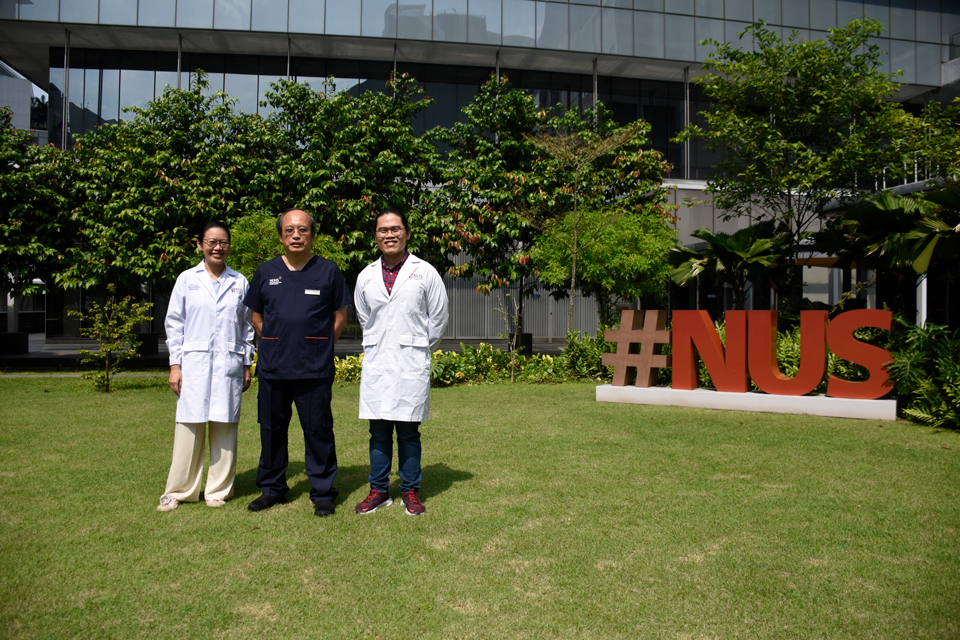Novel cancer therapy extends lives of terminally ill dogs, shows potential for use in human patients
Published: 08 Jul 2024

From left: Dr Sarah Ho, A/Prof Yeo Tseng Tsai, Dr Woo Jun Yung
Researchers from the Department of Biochemistry and NUS Centre for Cancer Research (N2CR), at the Yong Loo Lin School of Medicine, National University of Singapore (NUS Medicine), have been pioneering a treatment using stem cell precision engineering technology, to deliver drugs directly to tumour sites in dogs and cats with late-stage cancer and no treatment options available. In the research led by Associate Professor Too Heng-Phon, the team modified MSCs, which can seek out cancerous tumours. These modified cells carry a potent ‘kill-switch’ (cytosine deaminase) that produces a high, localised concentration of a cancer-killing drug (5-fluorouracil) in the tumour environment. The ‘kill-switch’ subsequently induces anti-cancer immunity—by activating the cancer’s innate cGAS-STING and related pathways, which activate the immune response and suppresses the tumour.
To date, the treatment has been administered to nearly 100 dogs and cats with conditions such as perianal adenoma, lung metastasis, and sarcoma. Most animal patients showed signs of positive response, including full recovery, cancer remission and good quality of life. Through the course of treatment on all the animal patients involved in the study, there were no significant side effects observed—possibly due to the localised presence of the therapeutic cells which remain within the tumour environment. For example, one of the dogs which had a tumour around its eye, did not lose its sight despite the treatment that destroyed the tumour—pointing to the localisation of the treatment to the tumour site, which does not affect the function of surrounding organs.
While administering the treatment to the animal patients, the research team observed that some of the dogs with recurrent cancers did not experience any relapse nor side effects. This supports the idea that the engineered therapeutic cells, which were designed to have few side effects and help the body fight cancer, were working as intended. The research team is piecing together information from important studies in the field to gather more evidence to explain their findings. Unlike traditional chemotherapy, which often has harmful effects limited by dosage, MSCs are engineered to deliver treatment directly to the affected areas in high concentrations, minimising toxicity elsewhere in the body.
For late-stage cancers especially, the team found that there were still remnants of tumours that remained after a few rounds of the treatment. To target these remnants more precisely, the team further enhanced the treatment by utilising the MSCs’ payload to accentuate the cGAS-STING and related pathways, which have recently been reported to be critical for the delivery of chemotherapy drugs, including 5-fluorouracil, in activating anti-cancer immunity. The mechanism was also enhanced with the expression of interferon beta—a cytokine that is known to recruit and facilitate T-cell activation for anti-cancer immunity. The expression of interferon beta can be tricky: too much of it in the blood can result in side effects, but a correct amount can be extremely powerful and efficient in targeting the cancer.
A/Prof Too said, “We are making the treatment more efficient by modifying cells that are like ‘hunter killers’ where they home in on the tumours and destroy only these tumours and not other healthy parts of the body. This explains why there are no side effects. Drugs in chemotherapy usually lead to some level of side effects. Our treatment taps on the body’s own biological system, which treats the tumour with no significant toxicity—this surpasses what drugs in chemotherapy can do.”
In January 2024, A/Prof Too led two senior research fellows from his team, Dr Sarah Ho and Dr Woo Jun Yung from the Department of Biochemistry and N2CR at NUS Medicine, to establish the AGeM Bio Pte Ltd*. With the enhanced treatment, the research team is seeking validation for the manufacturing processes to prepare the treatment for use in human patients—estimated to be completed by the third quarter of 2025. The team hopes to commence the first phase of human clinical trials in end-2025, where they will work with clinicians from the National University Hospital (NUH), to deliver intratumoural injections of the engineered MSCs to a small number of patients with recurrent glioblastoma—a debilitating form of brain tumour. After the first phase of the trials, the team will conduct subsequent trials with larger groups of patients over the next few years to collect data about its efficacy in human patients and enhance the treatment.
*(”AGeM” refers to ‘augmented gene modification’, and the corporation is a spin-off from NUS and the National University Health System (NUHS), with funding support from NUS Medicine, NUHS, Agency for Science, Technology and Research (A*STAR), Singapore-MIT Alliance for Research and Technology (SMART), and National Health Innovation Centre Singapore (NHIC)).

